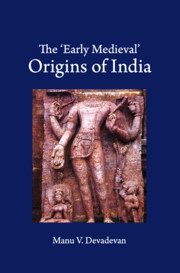Book contents
- Frontmatter
- Dedication
- Contents
- List of Tables
- List of Maps and Figures
- Acknowledgements
- 1 Introduction
- I INSTITUTIONS
- 2 State Formation and Its Structural Foundations
- 3 From the Cult of Chivalry to the Cult of Personality: The Seventh- Century Transformation in Pallava Statecraft
- 4 Changes in Land Relations and the Changing Fortunes of the Cēra State
- 5 Temple and Territory in the Puri Jagannātha Imaginaire
- II IDEAS
- 6 Svayaṃbuddha's Predilections: The Epistemologies of Time and Knowledge
- 7 Bhāravi and the Creation of a Literary Paradigm
- 8 Knowing and Being: The Semantic Universe of the Kūḍiyāṭṭaṃ Theatre
- 9 The Invention of Zero and Its Intellectual Legacy
- III IDENTITIES
- 10 The Evolution of Vernacular Languages: A Case Study of Kannada
- 11 Religious Identities in Times of Indumauḷi's Grief
- 12 Caste, Gender, and the Landed Patriarchy
- 13 The Making of Territorial Self Consciousness (with Particular Reference to Kaliṅga)
- Bibliography
- Index
12 - Caste, Gender, and the Landed Patriarchy
Published online by Cambridge University Press: 02 May 2020
- Frontmatter
- Dedication
- Contents
- List of Tables
- List of Maps and Figures
- Acknowledgements
- 1 Introduction
- I INSTITUTIONS
- 2 State Formation and Its Structural Foundations
- 3 From the Cult of Chivalry to the Cult of Personality: The Seventh- Century Transformation in Pallava Statecraft
- 4 Changes in Land Relations and the Changing Fortunes of the Cēra State
- 5 Temple and Territory in the Puri Jagannātha Imaginaire
- II IDEAS
- 6 Svayaṃbuddha's Predilections: The Epistemologies of Time and Knowledge
- 7 Bhāravi and the Creation of a Literary Paradigm
- 8 Knowing and Being: The Semantic Universe of the Kūḍiyāṭṭaṃ Theatre
- 9 The Invention of Zero and Its Intellectual Legacy
- III IDENTITIES
- 10 The Evolution of Vernacular Languages: A Case Study of Kannada
- 11 Religious Identities in Times of Indumauḷi's Grief
- 12 Caste, Gender, and the Landed Patriarchy
- 13 The Making of Territorial Self Consciousness (with Particular Reference to Kaliṅga)
- Bibliography
- Index
Summary
In popular imagination as well as in academic judgement, India is a land of castes. The caste system is widely held to be the country's defining feature and its point of distinction from the rest of the world. It is described variously as a blessing, a scientific method of classification, a noble principle in origins that underwent corruption with the passage of time, a necessarily evil, and a curse that is best done away with, with scholarly consensus generally weighing in favour of the last of these views. Yet, almost everything that we know of caste comes from contemporary ethnographic studies and the colonial archives. The insights from these sources are often complemented by attempts to identify parallels thereof in early literatures such as the Brāhmaṇa, the Kalpasūtra, and the Dharmaśāstra texts.
Underlying this essentialist approach to caste is the rather naïve impression that caste has an ideational autonomy that has in its bare essentials remained insulated from all possible forms of historical determinism. Its transformation across time is, therefore, neither a transformation of form nor one of content to any substantial degree, but only a change or an adaptation that the spirit of caste is subjected to. This appreciation of caste is counterfactual and, from the vantage point of a materialist understanding of history, counterintuitive as well. For before the nineteenth century, caste existed as a system with a substance involving a historically produced relationship with land. Things were pretty much the same at the dawn of the nineteenth century, but by the opening years of the twentieth century when ethnographic studies into caste had already made humble beginnings, caste had begun to cease to be such a system. It was fast turning into a mode of differentiation governed, as before, by access to resources, but powered by access to and allocation of political identities on the one hand and determined by the new secular labour market—based on un-inherited labour—on the other. Its organizing principle was a mentality called casteism, which has no foundations other than putative memories that serve to endorse or explain current-day prejudices.
- Type
- Chapter
- Information
- The ‘Early Medieval' Origins of India , pp. 341 - 386Publisher: Cambridge University PressPrint publication year: 2020



